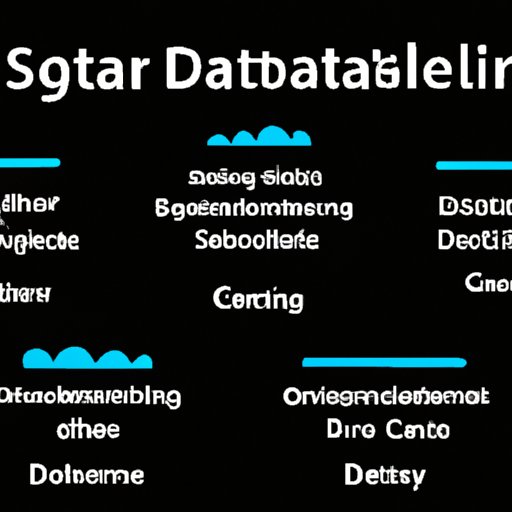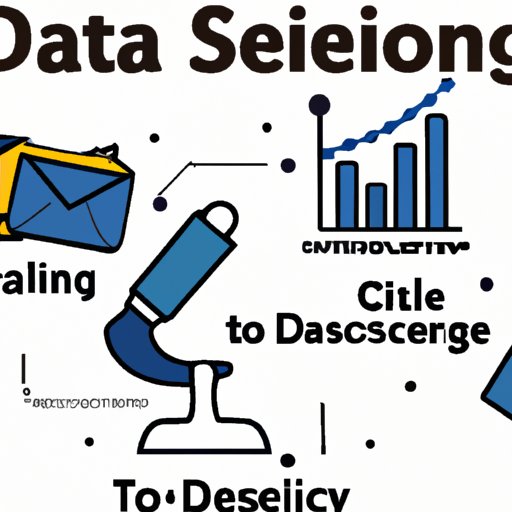Introduction
Data science is one of the most sought-after skillsets in the modern job market. With its ability to analyze, process, and interpret massive amounts of data, data science has become an essential tool for businesses looking to gain insights into their operations. But what exactly is a data science job? What do data scientists do? In this article, we’ll explore the different roles and responsibilities of a data scientist, as well as the benefits of working in this field.

Interviewing a Data Scientist: An Inside Look at a Data Science Job
We spoke with Andrew, a data scientist who works in the healthcare industry. He told us that data science is really all about connecting the dots between different pieces of data and using those connections to make decisions or come up with new ideas. “It’s like detective work,” he says. “You’re trying to uncover patterns and trends that can help you solve problems or create solutions.”
So what skills does a data scientist need? According to Andrew, it’s important to have strong analytical and problem-solving skills. “You need to be able to take raw data and turn it into something meaningful and useful,” he says. Additionally, knowledge of coding languages such as Python, R, and SQL is also beneficial. “These tools allow you to manipulate and visualize data in ways that can give you powerful insights.”
As for a typical day in the life of a data scientist, it really depends on the project. Andrew typically starts his day by reviewing any new data that has come in overnight and then moves on to analyzing that data and finding patterns. He also spends time developing models and algorithms to help make predictions or generate recommendations. Finally, he wraps up his day by preparing presentations to share his findings with stakeholders.

Exploring the Different Roles and Responsibilities of a Data Scientist
Data scientists can work in many different roles and industries. Here are some of the most common data science jobs:
Data Analysts
Data analysts are responsible for collecting, organizing, and analyzing data. They often use statistical analysis and predictive modeling to identify trends and draw conclusions. Data analysts may also be tasked with creating reports and visualizations to summarize their findings.
Machine Learning Engineers
Machine learning engineers are responsible for designing, building, and maintaining machine learning systems. They use advanced algorithms and techniques to develop models that can recognize patterns and make predictions. Machine learning engineers must have a deep understanding of computer science, mathematics, and statistics.
Business Analysts
Business analysts are responsible for using data to improve business operations. They may analyze customer data to identify opportunities for improvement or review sales data to determine which products are selling well and which ones aren’t. Business analysts must have excellent communication skills in order to effectively communicate their findings to stakeholders.
Data Visualization Specialists
Data visualization specialists are responsible for turning complex data sets into easy-to-understand visuals. They use a variety of tools and techniques to create charts, graphs, and other visuals that allow people to quickly understand the data. Data visualization specialists must have a good eye for design and an understanding of how to best present data.
The Benefits of Working as a Data Scientist
Working as a data scientist comes with many benefits. According to a recent survey conducted by Kaggle, an online platform for data scientists, 85% of respondents said they believe data science is a rewarding and fulfilling job. So why is data science so popular? Here are some of the top benefits of working as a data scientist:
High Demand for Data Scientists
Data science is one of the most in-demand skills in the tech industry. According to a report from Burning Glass Technologies, a labor market analytics firm, there were over 8,000 job postings for data scientists in the United States in 2018. This number is expected to continue to grow as companies look for new ways to leverage data to gain insights and make better decisions.
Opportunities for Professional Growth
Data science is a rapidly changing field, and staying up to date on the latest technologies and trends is key to success. Data scientists have the opportunity to continuously learn and grow their skills, making them more valuable to their employers. Additionally, data scientists can also apply their knowledge and skills to other areas, such as marketing, finance, and healthcare.
High Salaries
Data scientists are highly valued by employers, and as a result, they tend to command high salaries. According to Glassdoor, the average base salary for a data scientist in the United States is $116,840 per year. Additionally, most data scientists also receive bonuses, stock options, and other benefits.

How to Get Started in a Data Science Career
If you’re interested in starting a career in data science, there are several steps you can take to get started. Here’s what you need to know:
Educational Requirements
Most data science jobs require a bachelor’s degree in a related field, such as computer science, mathematics, or statistics. However, if you don’t have a degree, you can still pursue a career in data science by taking online courses or earning certifications. For example, Coursera offers a range of data science courses that can help you get up to speed on the necessary skills.
Necessary Skills and Experience
In addition to a degree, you’ll need to have experience with programming languages such as Python, R, and SQL. You should also be familiar with machine learning algorithms and techniques, as well as data visualization tools such as Tableau and Power BI. Finally, you should have strong analytical and problem-solving skills.
Finding Job Opportunities
Once you have the necessary skills and experience, you can start searching for job opportunities. Popular job search sites such as Indeed and Glassdoor are great places to start. Additionally, LinkedIn is a great way to network with potential employers and stay up to date on the latest job postings.
Networking and Professional Development
Finally, networking and professional development are key to success in the data science field. Attend conferences, join meetups, and follow industry leaders on social media to stay up to date on the latest trends and technologies. Additionally, consider joining professional organizations such as the International Association for Statistical Computing or the American Statistical Association.
Conclusion
Data science is one of the most in-demand fields in the tech industry. From data analysts to machine learning engineers, there are a variety of data science jobs available. These jobs offer high salaries, opportunities for professional growth, and the chance to work with cutting-edge technologies. To get started in a data science career, you’ll need a degree in a related field, as well as experience with programming languages, machine learning algorithms, and data visualization tools. Finally, networking and professional development are key to success in the data science field.
(Note: Is this article not meeting your expectations? Do you have knowledge or insights to share? Unlock new opportunities and expand your reach by joining our authors team. Click Registration to join us and share your expertise with our readers.)
